Question Im just about to give up...I just read another readers question to you about the same topic.Wow, she had some of the same concerns. I feel like giving up on our 4month old Choc. Lab. I am the trainer and care giver to our lab. When I take him out,
at first he is fine and will do his business(if I walk him to the correct spot)that's another issue. My biggest concern is he is bitting in a mad display rage. He freaks out jumping at me, bitting. I pet and love on him. He is lovable, but gets crazy. I have tried redirecting him than decided to show him i am boss and push him away and than ended up hitting him away to protect myself, he just wouldnt stop until I physically held him still. I fear him getting stronger and his bits harder. I have a 6year old I had orginally hope for them to be pals. But she is afraid of him.Ive tried everything to get him not to play bite or stop his rage bitting.I dont have hours each day to train him anymore. Should I find a new home for him while he's young? I'm frustrated and kinda a fraid.
AnswerI find it hard to relate your description to typical behavior. Not sure just what is happening. It does not sound like the common play where litter mates have a grand time carrying on like they were trying to kill each other and expect people to play the same way. Whatever the problem, it is going to take more than what I may have said in the other answer. You must take control as you have been trying to. Here are some exercises that may help. You will need the variations for older puppies.
''Elevation for small puppies: Sit on the floor and gently put your hands around your pup's middle, below his front legs, and lift him up. He is facing you. Hold him for 15 seconds. Repeat until he no longer struggles. If he is past 10-12 weeks, lift his front feet off the ground, but don't pick him up.
Cradling for small puppies: Hold your puppy gently on his back, as you would cradle a small baby. If he struggles, hold him firmly until he quiets for 10-15 seconds. With larger pups, you can do this as your sit on the floor, with your pup between your legs.
Quiet lying down: Place your pup on the floor on his side, with all 4 legs pointing away from you. Use your hands on his neck/shoulder area and middle, to hold him in this position. When he is quiet, praise him. Lengthen the time that you keep him quietly in this position. When he accepts this position well, handle his paws and muzzle, while keeping him quiet.''
The quotes mean this isn't my original work. It is copied from my Puppy Raising Manual. I have long used these or minor variations of them, and they are very effective. You may want to give him a belly rub while he is on his back too. Helps bonding. There is a big difference between him rolling over and demanding a belly rub, and you choosing a time to roll him over and rub his belly. The latter cements your place as pack leader.
Most 6 year olds are past the stage of enjoying typical puppy play. Do not expect too much interaction, although both dogs should enjoy having another dog around.

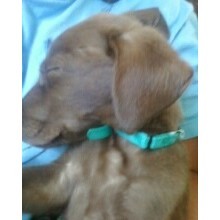 11 week old chocolate lab
Question
11 week old lab
We recently got a chocolate la
11 week old chocolate lab
Question
11 week old lab
We recently got a chocolate la
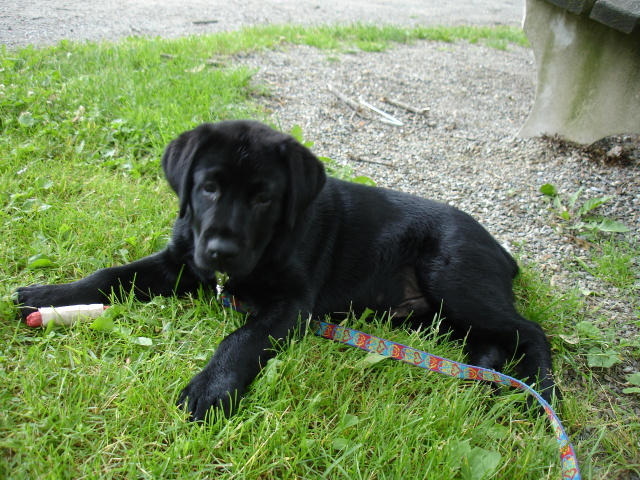 Is my lab puppy growing to fast?
Questionjust hanging out!
QUESTION: I recently t
Is my lab puppy growing to fast?
Questionjust hanging out!
QUESTION: I recently t
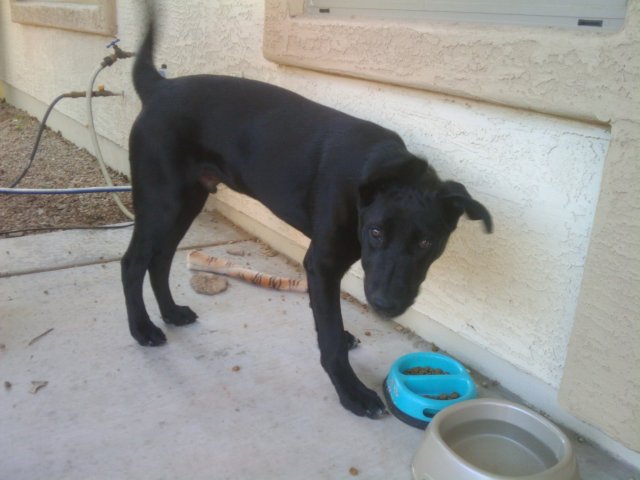 Black Lab age/weight concern
Question
Okimasu
I have a black lab mix. He has a small
Black Lab age/weight concern
Question
Okimasu
I have a black lab mix. He has a small
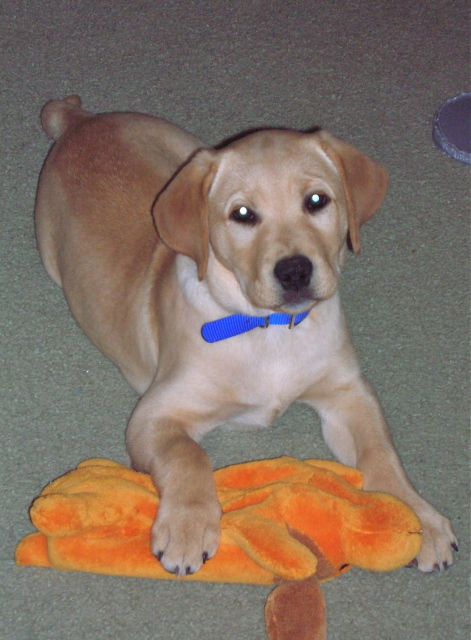 constant puppy barking
Question
My 13 week old female yellow lab barks consta
constant puppy barking
Question
My 13 week old female yellow lab barks consta
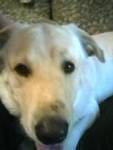 sniffing female owner
Question
Jack
Hello, thank you so much for taking the t
sniffing female owner
Question
Jack
Hello, thank you so much for taking the t